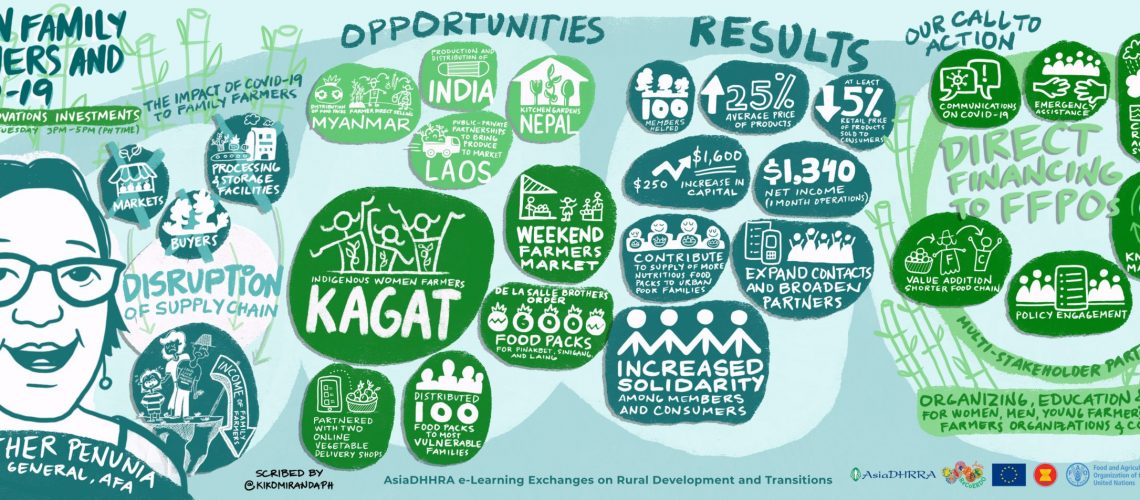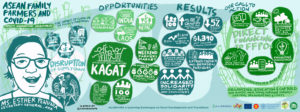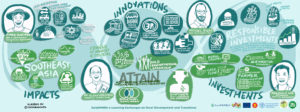The webinar “ASEAN family farmers and COVID-19: impacts, innovations, investments” provided an opportunity to discuss the impact of COVID-19 in the agricultural sector of the ASEAN countries, examine challenges to food systems, and identify measures and opportunities to build more resilient and sustainable agriculture and food systems in the recovery phase.
The COVID-19 pandemic is having a severe impact on the lives and livelihoods of family farmers in Southeast Asia and is expected to result in increased poverty and hunger in the region. “As a result of the pandemic, the volume of food production was reduced by 3.11 percent or 17.03 million tons due to the decline of agricultural farm labour, which affected 100.77 million people” informed Dr. Glenn Gregorio, Director of the Southeast Asian Regional Center for Graduate Study and Research in Agriculture (SEARCA).
In Southeast Asia, as in other parts of the world, movement restrictions imposed to curb COVID-19 caused the disruption of supply chains putting family farmers under great strain to sustain their livelihoods and agribusinesses.
“We could not get to the markets and traders and buyers could not get to our farms. Offices, hotels and restaurants were closed so there was no demand for food supply. We were forced to sell low or donate our produce to families in need,” explained Esther Penunia, Secretary General of Asian Farmers’ Association for Sustainable Rural Development (AFA).
Indeed, this pandemic has laid bare the fragility of agricultural value chains, which has taken the greatest toll on family farmers and vulnerable agricultural workers. Panelists agreed that a measure that would mitigate some of the problems related to reduced mobility is to bring the consumer closer to the producer by investing in shorter value chains.
Leveraging innovation and digital technologies will also play a crucial role in recovering from the pandemic: “Because farmers are not able to sell their produce, they don’t have cash to invest in crops for the following season. The use of electronic vouchers and exploring the expansion of other digital solutions could provide an opportunity to close this gap,” said Reginald Lee, Director of Partnerships at Grow Asia.
In the experience of Jumar Marcaida, a youth representative of family famers in Philippines: “Due to the lockdown, cooperatives became more imaginative in finding ways to add value to their products. Also, to link farmers to consumers they organized online home delivery services and used social media to market their products.”
At another level, Michel Riggs, FAO team leader of the responsible agricultural investment team at FAO, reminded that before the pandemic the agricultural sector in Southeast Asia suffered from great underinvestment. “In the region, 35 percent of working people are employed in agriculture, but the sector contributes only about 10 percent of the GDP and credits in the sector are below 3 percent.” Now, it is likely that the level of investment will decline even more due to the pandemic.
Low investment will have a particular impact in youth, whose engagement in agriculture was another key topic in the discussion.
“COVID 19 is having a particularly acute impact on youth. Young people who are working in agriculture are more likely to become unemployed and to be working informally without social protection. By investing in agriculture, we can give youth an opportunity to stay in rural areas and create successful business enabling them to make a living and contribute to making rural areas thrive,” said Michael Riggs. Likewise, young farmer Jumer Marcaida called for the strengthening of the role of young farmers, including by putting in place specific policies targeted at youth.
In support of young farmers, Marlene Ramirez, Secretary General of the Asian Partnership for the Development of Human Resources in Rural Asia (AsiaDHRRA), also stressed the need to converge multi-stakeholders actions, especially at the national level, in lieu of the UN Decade for Family Farming 2019-2028.
Finally, a key takeaway is the need to not only invest more but to ensure that investment is responsible, and creates sustainable benefits for businesses, be it a big corporation or the business of a young farmer, but also communities and the environment. The definition of what constitutes a “responsible investment” in agriculture is provided in the ASEAN Guidelines to Promote Responsible Investment in Food, Agriculture and Forestry.
The webinar was organized by the AsiaDHRRA, AFA, PAKISAMA, and FAO.
Watch the full webinar here: https://youtu.be/27350KB68Ww





